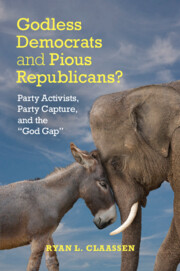Book contents
- Frontmatter
- Dedication
- Contents
- Figures
- Tables
- Acknowledgments
- Introduction
- 1 The Religious Divide in American Politics
- 2 Mobilization, Capture, and Misunderstood Trends
- 3 Representation and Four Forces that Shape Change Among Activists
- 4 First Force, The Effect of Being Fruitful and Multiplying
- 5 Second Force, The Effect of Voting Early and Often
- 6 Third Force, The Effect of Picking a Side
- 7 Fourth Force, The Effect of Writing Checks and Knocking on Doors
- 8 “Capture” Revisited, Representation, and Religious Activists
- 9 Conclusion
- Appendix A Coding for the Major Religious Traditions
- Appendix B Frequencies for Change Factor Computations
- Appendix C The Raw Materials for Assessing the Role of Demographic Change in the Activist Pools
- Appendix D Voter Loyalty Trend Estimates with Additional Control Variables
- Appendix E Republican Voter Loyalty Among Evangelicals and Region Versus Religion
- Bibliography
- Index
1 - The Religious Divide in American Politics
Published online by Cambridge University Press: 05 June 2015
- Frontmatter
- Dedication
- Contents
- Figures
- Tables
- Acknowledgments
- Introduction
- 1 The Religious Divide in American Politics
- 2 Mobilization, Capture, and Misunderstood Trends
- 3 Representation and Four Forces that Shape Change Among Activists
- 4 First Force, The Effect of Being Fruitful and Multiplying
- 5 Second Force, The Effect of Voting Early and Often
- 6 Third Force, The Effect of Picking a Side
- 7 Fourth Force, The Effect of Writing Checks and Knocking on Doors
- 8 “Capture” Revisited, Representation, and Religious Activists
- 9 Conclusion
- Appendix A Coding for the Major Religious Traditions
- Appendix B Frequencies for Change Factor Computations
- Appendix C The Raw Materials for Assessing the Role of Demographic Change in the Activist Pools
- Appendix D Voter Loyalty Trend Estimates with Additional Control Variables
- Appendix E Republican Voter Loyalty Among Evangelicals and Region Versus Religion
- Bibliography
- Index
Summary
The scholarly roots of a partisan God gap are relatively recent (Green 2007; 2010a; 2010b; Green and Silk 2004; Olson and Green 2006; Olson and Warber 2008; Smidt et al. 2010). Initially, culture war scholarship highlighted new political divisions among religious people, not a divide between the religious and the nonreligious. Wuthnow (1988) and Hunter (1991) pitted the Christian left against the Christian right in a “culture war.” Interdenominational political differences had given way to differences within religious traditions over orthodoxy. Political differences between Protestants and Catholics were becoming smaller while a widening political gulf divided the progressive and orthodox wings within each religious tradition, according to the culture war theory.
However, subsequent work exploring the culture war thesis shifted from an investigation of rising intradenominational differences to comparisons of the political attitudes and behaviors of religious persons and Secular persons (Bolce and De Maio 1999a; 1999b; 2002; Putnam and Campbell 2010; Green 2007; Hansen 2011; Kellstedt 2011; Olson and Green 2006; Olson and Warber 2008; Norris and Inglehart 2004). The shift in focus began as scholars challenged Hunter's premise that religious orthodoxy made common cause for conservative elements in different denominations (Brooks 2002; Brooks and Manza 1997, 2004; Manza and Brooks 1997). Responding to this challenge, scholars sought to identify rifts within religious traditions. Fundamentalist religious beliefs (e.g., belief that the Bible is the literal word of God) and religiosity (e.g., frequency of attendance at religious services) emerged as key divisions between more orthodox or traditional adherents and more progressive ones (see Green 2007, Chapter 3). Additional interest in religiosity was fueled by the rise of the “nones,” a trend the United States appeared to be resisting at the dawn of the culture war literature. As the rising tide of “nones” contributed to a growing political divide between frequent and infrequent attenders, worship attendance eventually came to dominate reporting on the God gap to the near total exclusion of other aspects of religious orthodoxy or traditionalism.
- Type
- Chapter
- Information
- Godless Democrats and Pious Republicans?Party Activists, Party Capture, and the 'God Gap', pp. 11 - 24Publisher: Cambridge University PressPrint publication year: 2015



